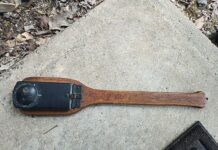“In the good earth lies your richest blessing; ’tis the fortune of your life — you’ll want for naught; you’ll know no sighs nor sorrow; you’ll neither beg nor borrow; today provides for tomorrow; joy and honor is your portion and your lot.”
— translation of Yiddish song at the turn of the century encouraging the farm movement.
By JUDITH SUTHERLAND
Farm and Dairy columnist
Throughout the history of the world, many stories of victories and defeat have unfolded, all of them involving and impacting individuals and families. Now, as then, the world goes on, in spite of massive challenges and fears. It is sometimes both important and soothing to recall this.
One such life story, written by Brenda Weisberg Meckler, tells of a Russian family who stole across the border into Germany in 1904. Brenda, known as “Goldie” to her parents, was 4 years old.
Career move
From those first steps toward freedom, the family then came to America, living in Boston and Cincinnati, eventually settling near New Richmond, Ohio. Unlike most of their Jewish kin, the Weisbergs did not find their calling in the city, but instead became farmers, with help from an uncle who had already settled here.
“A Jew belongs on the land. It is honorable; it is healthy; you’re your own master; nobody has you in his pocket,” were the quotes Goldie recalled from her uncle.
These were frightening times in the history of the world; people lived in fear of nearly everything. People believed growing their own food would save them from sure poisoning in an uncertain world.
On a little farm in the Midwest, Goldie learns to hand-milk the cows before and after school, starting on Daisy, the gentle one of the small herd. “After a week, I was able to direct the streams of milk away from my elbows into the pail of foaming liquid, still warm from the udder.”
Games
Her mother made a game of the milking, saying, “I am going to play a tune on the milk bucket, and you have to guess what it is. If you are right, you don’t dry dishes tonight.”
She explains, “Mama was milking Rosie for the last time, for Rosie was going to have a baby and would soon go dry to save all her milk for her calf. I listened to the beat of the stream of milk hitting against the side of the pail. Mama had to “play” it three times before I caught on.”
Goldie called out the name of the song and mother and daughter began to sing along. “Mama had a gift for making games out of many humdrum things.”
Goldie describes making butter, battling potato bugs, helping with the bountiful tomato harvest, finding mushrooms in a meadow for the family’s supper, walking to school — all backdrops to the larger picture which involved making a new life in a new world.
One of the most interesting stories involved Goldie being invited to Sunday school by neighbor girls. Startled, Goldie’s mother had to consult with her husband.
Turning point
The couple approached the neighbor girls together and said, “You know, we are Jewish.” The older of the neighbor girls answered, “Yes, sir. Does that make any differences?” The father answered, “Maybe. Jews don’t believe that Jesus is God’s son.”
The author recalls, “Ginny and Kate looked at each other. Ginny said, ‘I don’t think she has to. I won’t try to make her. She can just pray to God. That’s all right, isn’t it?'”
After Goldie’s parents exchanged a glance, they agreed it would be all right. Goldie was delighted, for it meant she would not be treated differently, she would not be left out of many special things in her new community, and it changed and solidified her place in the new world for her entire lifetime. A different stance would have had negative ramifications for everyone involved.
It is a simple story, but such an enlightening one. We can, and have, lived together in this country through many turning points, through many tantamount, transforming events. We have stood shoulder-to-shoulder in spite of our differences, some large, some insignificant in the scheme of things.
Goldie grew up “amid the cornfields and red clover, the buckeyes and the dogwoods,” eventually teaching school, later becoming a Hollywood screen writer, a pioneer in writing for television who also penned many magazine stories. At the age of 87, she wrote Papa Was a Farmer, her first book.
Lessons
Each of us can learn from this life, and from those who welcomed this family in the new America. We must not lose sight of the fact that never in the history of the world has there been total peace, tranquility, perfection.
It is up to us to attempt to create the best for ourselves and for the children coming up in this world. We must do our best in our own place, and pray for clarity and positivity in our decisions, our actions, our single steps toward an unforeseen future.











